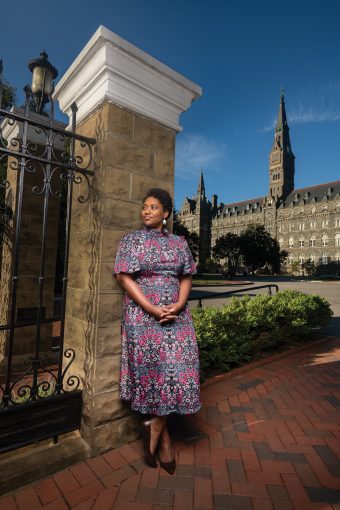Published on Show Me Mizzou Dec. 17, 2021
Story by Tony Rehagen BA, BJ ’01

Like so many students, Marcia Chatelain came to Mizzou with ambitions of becoming a journalist, reporting and writing daily stories that would make a difference in the world. But it wasn’t until she arrived on campus and dove into disciplines outside the J-School that she realized she could use her journalistic skills to tell even deeper, more important stories than she ever could have imagined.
Today, Chatelain, BA, BJ ’01, is a professor of history and African American studies at Georgetown University. And her latest book, Franchise: The Golden Arches in Black America, a look at the long and complex relationship between Black America and McDonald’s, won the 2021 Pulitzer Prize in history.
Chatelain first arrived on campus as a high school student from Chicago participating in a workshop on urban journalism. The friendships and faculty connections she made in Columbia helped her choose Mizzou over other schools. As an undergraduate, she brought a passion for writing about myriad topics and introducing readers to new experiences. At the same time, her own eyes were opened to the vast possibilities now at her fingertips at MU. She took an introductory class in religious studies and was enamored of its practice of digging deeper into bigger, more abstract ideas. “Journalism taught me how to research and write quickly and think through the strategy of talking about big ideas in short,” Chatelain says. “Religious studies is longer-term research. At that point, I knew my future wouldn’t be in journalism in a traditional way.”
She picked up religious studies as a second major, with additional work in history. Meanwhile, she was also throwing herself into campus life outside the classroom. As a sophomore, she worked as a peer adviser for a Freshman Interest Group, and in the summers, she worked for the same journalism program that first brought her to Mizzou, both of which helped foster her love of teaching. She also got involved in addressing inequalities on campus by helping gather resources to create MU’s LGBTQ center and working against discrimination in all its forms.
A particularly powerful project was the Hate Report, a publication that started as a chronicle of hateful graffiti found on campus and evolved into a collection of essays and reported stories raising awareness of hate speech and other racial injustices. “At the time, she was just a lowly undergraduate, and here she is talking to people, getting an idea of the climate that makes respect so difficult,” says Ted Tarkow, then an associate dean of the College of Arts and Science. “Those efforts helped lay the groundwork for other initiatives. She turned scholarship into action, history into advocacy and paved the way for a future that’s better for everyone.”
As a junior, she became a Truman Scholar, a prestigious national award that emphasizes public service. After graduating, she worked in Washington, D.C., as a resident scholar at the Harry S. Truman Scholarship Foundation. Then she attended Brown University, where she earned a doctorate in American civilization. She has been teaching at Georgetown University for more than a decade.
Franchise, Chatelain’s second book, examines the complex history of McDonald’s and how fast food not only has victimized vulnerable communities through obesity and diabetes but also fostered Black wealth and entrepreneurialism. “The book, like all of Marcia’s work, is informed by her journalistic training, making it relevant and accessible,” says Sonja Steptoe, BA, BJ ’82, a communications strategist and fellow Truman Scholar. “But make no mistake, Marcia is a historian of the first rank.”
Although Chatelain might not use her magazine journalism degree directly, she credits her time and experience in Columbia as a reason for her success. “I never would have thought about being a college professor if it hadn’t been for the mentors I had at MU,” she says. “And the education I got outside of the classroom was as valuable as what I got in the classroom. It helped shape my trajectory afterward.”



